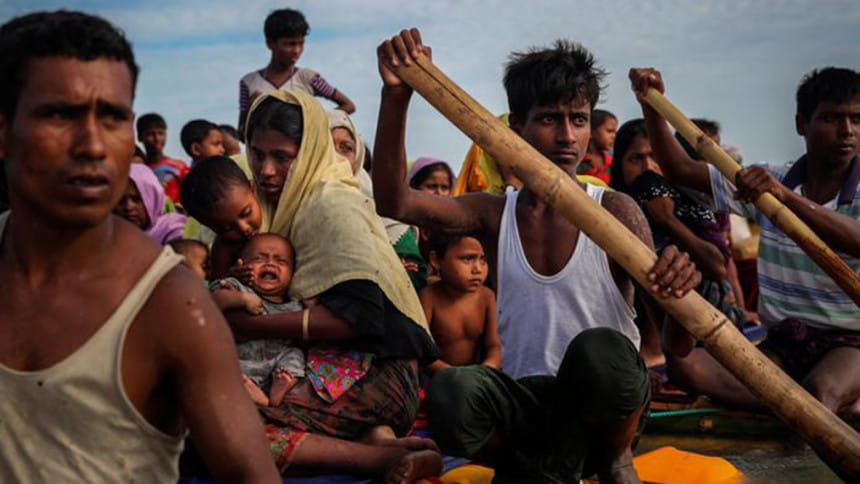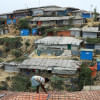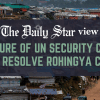UNSC should refer Myanmar to ICC: HRW

Human Rights Watch yesterday said the United Nations Security Council (UNSC) should immediately refer the situation in Myanmar, including the widespread and systematic abuses against ethnic Rohingya, to the International Criminal Court (ICC).
During the first week of May, senior diplomats from the 15-member Security Council visited refugee camps in Bangladesh to see the firsthand situation of more than 700,000 Rohingya refugees who fled Myanmar military abuses since August 2017, adding to an estimated 200,000 Rohingya refugees who fled previous violence.
The diplomats pledged to take action on their return to New York. British Ambassador Karen Pierce said all council members considered the Rohingya issue to be "one of the most significant human rights cases that we have ever faced in the last decade and that something needs to be done" according to a report published by HRW yesterday."Now that the Security Council has heard directly from Rohingya refugees about the horrors inflicted by Myanmar's army... the need to hold those responsible to account should be clear," said Param-Preet Singh, associate international justice director.
"Myanmar's repeated and implausible denials of responsibility for atrocities and its longstanding culture of impunity mean that the International Criminal Court is the only real hope for victims to see justice" Param-Preet also said.
During their four-day visit to Myanmar and Bangladesh, the council members met humanitarian agencies, civil society groups, parliamentarians, and military and government officials, including Prime Minister Sheikh Hasina, Myanmar's de-facto civilian leader Aung San Suu Kyi, and Myanmar military commander-in-chief Senior General Min Aung Hlaing
While acknowledging a possible ICC referral, UK Ambassador Pierce told reporters that Aung San Suu Kyi assured the council members that if evidence of violations was provided to her, the Myanmar authorities would undertake a "proper investigation."
However, the Myanmar government has long been provided with evidence by Human Rights Watch and other international monitors and has taken no genuine action to impartially investigate the full range of abuses committed against the Rohingya.
For more than a year, the Myanmar government refused to allow access to the UN Fact-Finding Mission, created by the Human Rights Council (HRC) to "establish the facts and circumstances" of alleged security force violations.
It also barred Yanghee Lee, the UN-appointed human rights expert on Myanmar, from entering the country after she publicly reported on military abuses.
The government and military have dismissed voluminous reports from the UN, human rights groups, and the media on killings, rape, and burnings of Rohingya villages in northern Rakhine State. In November, an army "investigation team" said that at least 376 "terrorists" were killed during fighting but found "no deaths of innocent people."
While there has been no civilian-led investigation into the post-August 2017 violence, the National Investigation Commission on Rakhine State, established to investigate the violence against the Rohingya in October and November 2016, and headed by Vice President Myint Swe, concluded contrary to the evidence that there was "no possibility of crimes against humanity, no evidence of ethnic cleansing, as per UN accusations."
Myanmar authorities have convicted soldiers in only one case in Rakhine State for abuses committed after August 25, sentencing seven soldiers in April to 10 years in prison for their role in the massacre of 10 Rohingya in Inn Din village.
Two Reuters journalists who investigated the massacre were detained and face up to 14 years' imprisonment under the Official Secrets Act.
"By rejecting out of hand detailed accounts of atrocities, Myanmar's government has shown it has zero intention of addressing the terrible crimes against the Rohingya. Security Council members should not repeat empty promises by government officials that they will investigate abuses. This is a textbook case for referral to the ICC, which was created to act when governments refuse to do so," Singh said.
Under the Rome Statute of the ICC, the court can only act when a state is "unwilling or unable" to investigate or prosecute grave crimes in violation of international law.
Because Myanmar is neither a party to the ICC nor has accepted the court's jurisdiction, the Security Council needs to refer the situation to the court. In April, ICC prosecutor Fatou Bensouda asked the court to rule on whether the ICC "can exercise jurisdiction over the alleged deportation of the Rohingya people from Myanmar to Bangladesh," which is a party to the ICC.
The Security Council should refer the situation in Myanmar to the ICC immediately and not await a court ruling on the crime of deportation, which would not include other crimes against humanity, namely murder, rape, torture, and persecution.
The council should act on the secretary-general's September 2017 call that "the international community has a responsibility to undertake concerted efforts to prevent further escalation of the crisis."
Primarily because of objections from China and Russia, the council has adopted just a single Presidential Statement on the issue, in November. It last met to discuss the crisis in February.
Global concern with the Security Council's inaction on Myanmar has been rising. In February, Sweden's UN ambassador said, "If the Myanmar authorities do not genuinely address the issue of accountability, help from the international community should be sought, including considering referral to the International Criminal Court."
In May, after visiting a Rohingya camp, an assistant secretary general of the Organisation of Islamic Cooperation (OIC), said that the council's "powerful members had enough room to play, but failed to do that."
Liechtenstein's UN ambassador publicly expressed his hope that council members would return from their Myanmar visit with a renewed sense of duty to take action, including an ICC referral.
A former Malaysian foreign minister who had been the OIC's special envoy to Myanmar until 2017 said he was disappointed with the talks between the council and Myanmar: "They say that they will help Myanmar to investigate. Myanmar is the perpetrator of the crime. How can you want Myanmar to investigate? It must be an independent body."
"The UK and others should stop wringing their hands and put forward a resolution referring Myanmar to the ICC," Singh said. "Security Council members should stop deferring to China and Russia and make the victims of atrocities the top priority."

 For all latest news, follow The Daily Star's Google News channel.
For all latest news, follow The Daily Star's Google News channel. 






Comments